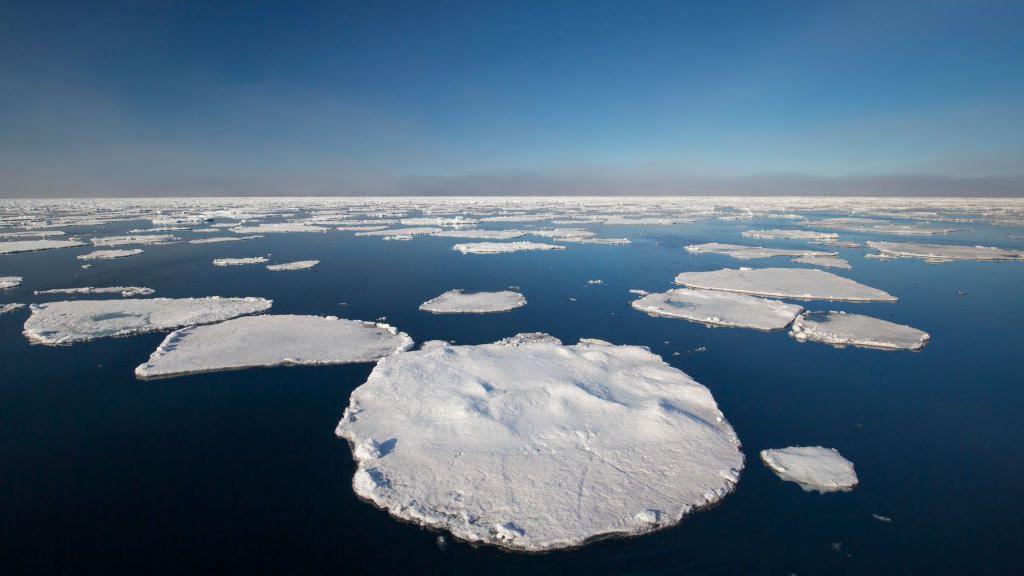An assessment by dozens of polar scientists cautions that proposed climate change mitigation strategies involving environmental manipulation in the Arctic and Antarctic are fraught with peril, unlikely to succeed, and could detract from the urgent need to transition away from fossil fuels.
These “geoengineering” approaches targeting polar regions aim to cool the planet through unconventional methods, such as artificially enhancing sea-ice thickness or dispersing minute, reflective particles into the atmosphere.
Such techniques have garnered attention as potential future tools in the fight against global warming, complementing efforts to reduce carbon emissions.
However, over 40 researchers assert that these methods could lead to “severe environmental damage” and advocate for prioritizing the pursuit of net-zero emissions, the only proven strategy for curbing global warming.
Geoengineering – defined as deliberate intervention in the Earth’s climate system to counteract the effects of global warming – remains one of the most contentious areas of climate research.
While some forms are widely accepted – for example, carbon dioxide removal from the atmosphere via afforestation or technological solutions is a recognized component of net-zero initiatives.
Net zero entails balancing the volume of planet-warming “greenhouse” gases generated by human activities with the amount actively removed from the atmosphere.
However, more radical approaches, such as reflecting sunlight, “are dealing with the symptoms of climate change rather than the causes,” according to lead author Martin Siegert, Professor of Geosciences at the University of Exeter.
Proponents argue that exploring techniques to mitigate rapidly rising temperatures is worthwhile, given that these escalating temperatures are already causing significant harm to people and ecosystems globally.
Conversely, opponents maintain that the associated risks are simply too high, especially for the vulnerable polar regions, about which much remains unknown.
The scientists behind the new assessment, published in the journal *Frontiers in Science*, analyzed the evidence supporting five of the most frequently debated polar geoengineering concepts.
They concluded that none of the concepts meet basic criteria relating to feasibility and potential environmental impacts.
One such proposal involves releasing minute, reflective particles known as aerosols into the upper atmosphere to cool the planet.
This concept often draws attention from online conspiracy theorists, who falsely claim that contrails – condensation trails formed by aircraft engines – are evidence of clandestine, large-scale geoengineering programs underway today.
However, many scientists have legitimate concerns, including potential disruption of global weather patterns.
These potential cascading effects also raise the question of who would have the authority to deploy such technologies – particularly in the Arctic and Antarctic, where governance is complex.
If a country were to implement geoengineering against the wishes of others, it could “increase geopolitical tensions in polar regions,” according to Dr. Valerie Masson-Delmotte, Senior Scientist at the Université Paris Saclay in France.
Another concern is that, despite some ideas being theoretically viable, the substantial costs and time required for scaling-up implementation make it highly unlikely that they would make a meaningful difference, according to the review.
A BBC News report recently examined a plan to pump seawater across the surface of Arctic sea-ice during winter to increase its thickness, thus improving its ability to withstand the summer melt season.
However, estimations suggest that covering 10% of the Arctic with such a scheme would necessitate approximately 10 million seawater pumps.
A more fundamental apprehension is that these types of projects could create a false sense of an alternative to reducing humanity’s greenhouse gas emissions.
“If they are promoted… then they are a distraction because to some people they will be a solution to the climate crisis that doesn’t require decarbonizing,” said Prof. Siegert.
“Of course that would not be true, and that’s why we think they can be potentially damaging.”
Even proponents of geoengineering research acknowledge that it is, at best, a supplement to net zero, not a substitute.
“The need for emissions reductions comes first… almost anything we do is futile without it,” according to Dr. Shaun Fitzgerald, Director of the University of Cambridge’s Centre for Climate Repair, which has been involved in some of the projects highlighted.
The assessment raises “very valid concerns” regarding some of the proposed ideas, but these concerns must be balanced against the risks posed by “the perilous state of the climate,” he argued.
Similar to many other supporters of geoengineering research, Dr. Fitzgerald does not advocate for large-scale deployment at this time and acknowledged that further investigation may reveal the ideas to be ultimately “bonkers.”
However, he maintained that more research would allow society to make “more informed decisions” regarding whether such interventions could aid or impede in the fight against climate change.
A UK government-backed agency recently announced nearly £60m of funding for such research, although the government has stated that it has no current plans to deploy these technologies.
Nevertheless, the authors of the new assessment deem these projects so unrealistic that efforts would be better focused on decarbonization and polar research.
“There are some basic home truths that don’t need an awful lot of research to come to a conclusion that they’re not really viable,” argued Prof. Siegert.
A UK government spokesperson stated: “Our priority is to reduce greenhouse gas emissions from human activities and to adapt to the unavoidable impacts of climate change.”
Sign up for our Future Earth newsletter to keep up with the latest climate and environment stories with the BBC’s Justin Rowlatt. Outside the UK? Sign up to our international newsletter here.
A review into the response calls for an overhaul of the financial and mental health support.
Nature experts say unprecedented hot and dry summer has had a major impact on wildlife.
Researchers say European production is in decline but the west of Scotland may provide perfect conditions.
Insect protein is healthy and sustainable. But now it is also at the centre of a far-reaching conspiracy theory.
North Northamptonshire councillors do not reach a decision on plans to delay becoming carbon neutral.

